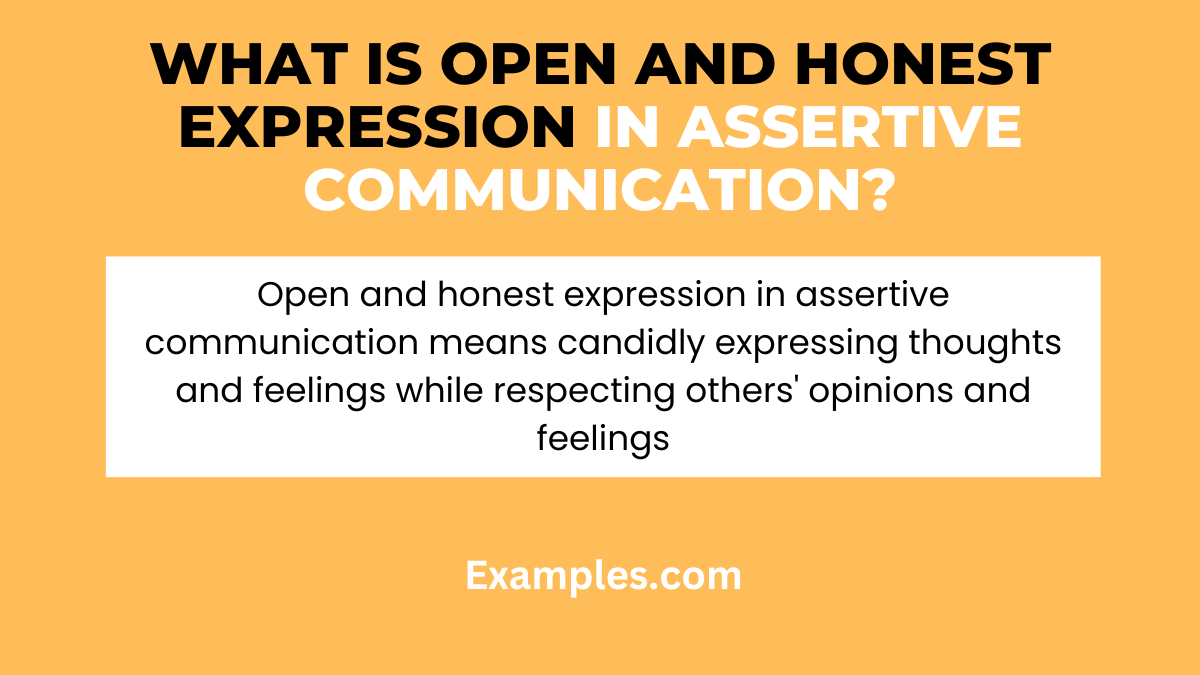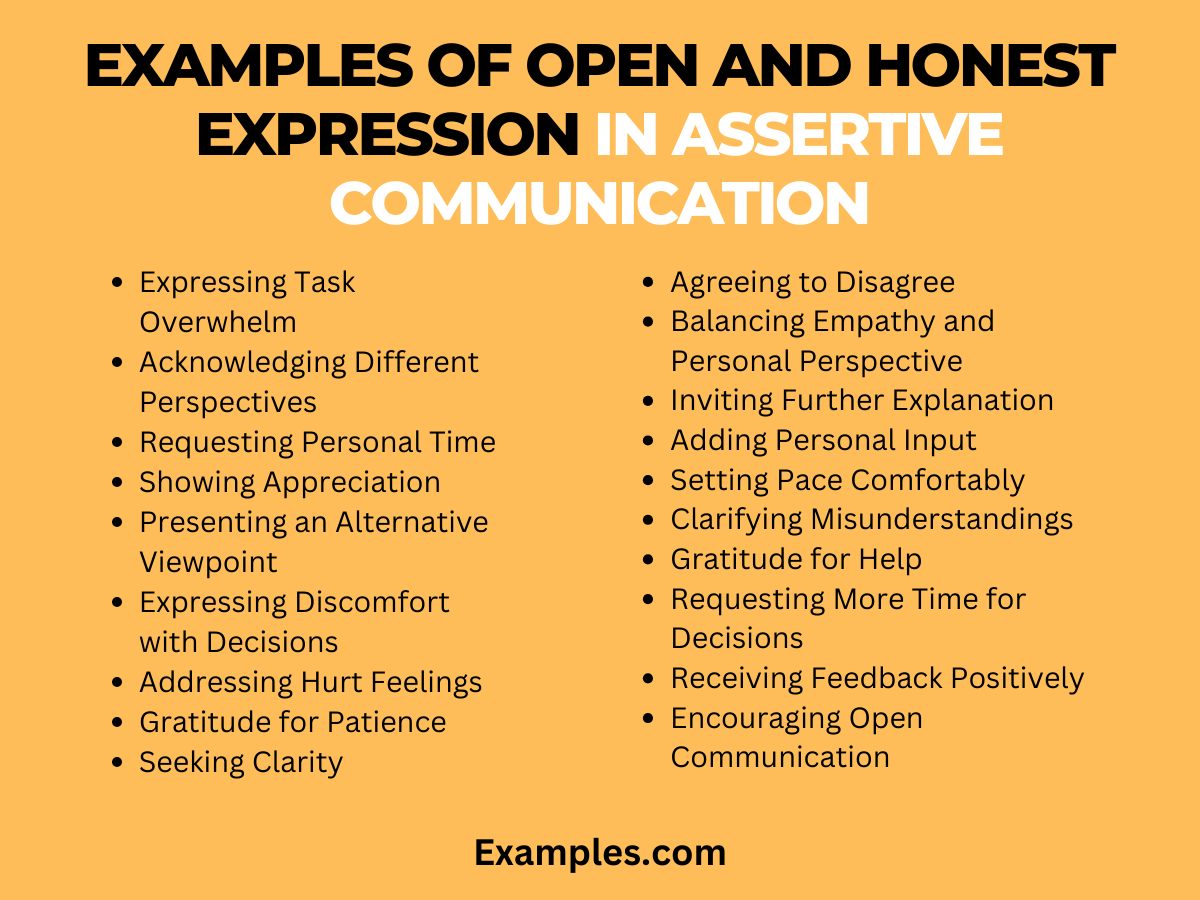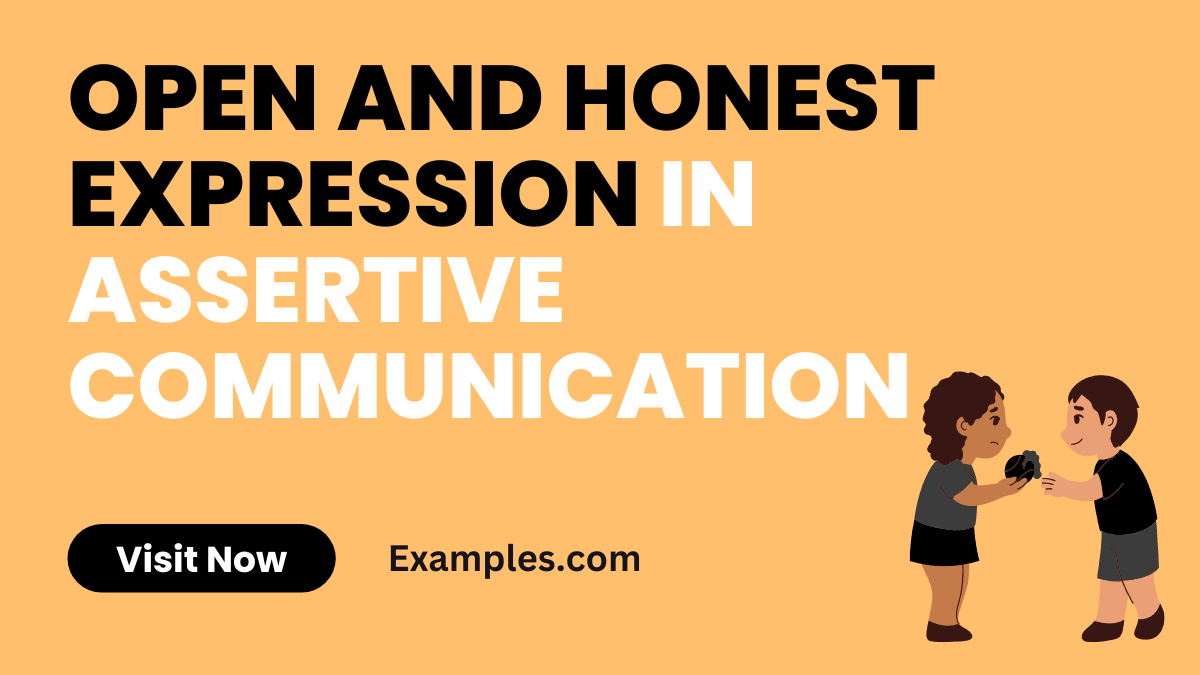19+ Open and Honest Expression in Assertive Communication Examples
In the realm of effective interpersonal skills, Open and Honest Expression in Assertive Communication stands as a cornerstone. It’s more than just a way of speaking; it’s an art that balances respect with directness. This guide delves into the essence of assertive communication, uncovering how open and honest dialogue can transform personal and professional relationships. By mastering this skill, you can navigate complex interactions with ease, ensuring your voice is heard while maintaining empathy and understanding.
What is Open and Honest Expression in Assertive Communication?

Open and Honest Expression in Assertive Communication is a dynamic approach that combines clarity, respect, and confidence. This method involves articulating thoughts and feelings directly, yet empathetically. It’s not just about what you say, but how you say it. By utilizing techniques like active listening and clear expression, you ensure your message is conveyed without ambiguity, fostering an environment of mutual respect and understanding.
What is the Best Example of Open and Honest Expression in Assertive Communication?
A prime example of this approach can be seen in a workplace scenario. Imagine a team meeting where a member disagrees with a proposed strategy. Instead of remaining silent or being confrontational, they use I statements and a respectful tone to express their concerns. They might say, “I understand the proposed plan, but I feel there could be potential challenges with implementation. Can we explore alternative strategies?” This approach promotes a healthy discussion without offending others, exemplifying open and honest expression in an assertive manner.
20 Examples of Open and Honest Expression in Assertive Communication

Open and Honest Expression in Assertive Communication involves articulating thoughts, feelings, and needs directly, respectfully, and with confidence. It’s a key part of effective interpersonal interactions, enhancing mutual understanding and respect. This approach fosters a positive environment, reduces conflict, and promotes healthy relationships. Mastering this skill requires practice and awareness of both verbal and non-verbal cues.
- “I feel overwhelmed when I have too many tasks. Can we discuss prioritizing them?”
Explains feelings clearly and seeks a collaborative solution. - “I appreciate your effort, but I have a different perspective.”
Respectfully disagrees while acknowledging the other’s viewpoint. - “I need some time alone to recharge. Let’s catch up later.”
Expresses personal needs without offending others. - “Your support means a lot to me.”
Shares positive feelings, strengthening the relationship. - “I disagree with this approach. Here’s what I think…”
Offers an alternative viewpoint confidently. - “I am not comfortable with that decision. Can we explore other options?”
Politely expresses discomfort and suggests collaboration. - “I felt hurt by your words. Can we talk about it?”
Opens up about emotional impact and seeks resolution. - “Thank you for waiting. Your patience is appreciated.”
Acknowledges the other person’s effort and shows gratitude. - “I need more information to understand your point of view.”
Seeks clarity without dismissing the other person’s opinion. - “I value our friendship, so I want to be honest with you.”
Prefaces a difficult conversation with affirmation of the relationship. - “Let’s agree to disagree on this matter.”
Proposes a respectful closure to a disagreement. - “I can see where you’re coming from, but here’s my take.”
Balances empathy with personal perspective. - “I’m not sure I agree. Can you explain further?”
Expresses uncertainty and invites more dialogue. - “I’d like to add my thoughts on this issue.”
Asserts oneself in a conversation without being overbearing. - “I’m not comfortable with this pace. Can we slow down?”
Communicates personal limits in a respectful manner. - “I think there’s a misunderstanding. Here’s what I meant.”
Clarifies a previous statement to avoid confusion. - “I’m grateful for your help. It made a big difference.”
Expresses gratitude and acknowledges the assistance received. - “I’m not ready to make a decision yet. I need more time.”
Communicates the need for additional time clearly. - “Your feedback is valuable, but I have a different view.”
Receives feedback positively while maintaining one’s own stance. - “I enjoy working with you. Let’s keep the communication open.”
Encourages ongoing, open dialogue in a professional relationship.
Importance of Open and Honest Expression in Assertive Communication
- Enhances Clarity: Open and honest expression in assertive communication ensures that messages are conveyed clearly, reducing misunderstandings and confusion.
- Builds Trust: When individuals consistently communicate openly and honestly, it fosters a sense of trust among colleagues and peers.
- Promotes Healthy Relationships: Transparent communication is key to maintaining healthy personal and professional relationships.
- Improves Problem-Solving: Open communication allows for the sharing of diverse viewpoints, leading to more effective problem-solving.
- Increases Self-Awareness: Practicing honesty in communication helps individuals understand their own values and boundaries better.
- Enhances Decision-Making: Honest expression provides a complete picture, aiding in better decision-making processes.
- Reduces Stress: When people express themselves openly, it decreases the stress associated with holding back thoughts and feelings.
- Encourages Mutual Respect: Openness in communication encourages respect between parties, as it demonstrates consideration for each other’s perspectives.
Open and Honest Expression in Assertive Communication at Workplace
- Promotes Effective Leadership: Leaders who communicate openly are more likely to inspire and motivate their teams.
- Fosters a Positive Work Environment: A culture of open communication contributes to a positive and inclusive work environment.
- Improves Employee Engagement: Employees feel more valued and engaged when their leaders communicate transparently.
- Encourages Innovation: Open expression of ideas and opinions can spark innovation and creative problem-solving.
- Strengthens Team Collaboration: Teams that communicate openly tend to collaborate more effectively and efficiently.
- Reduces Conflict: Honest communication can preempt conflicts by addressing issues before they escalate.
- Enhances Accountability: Clear and open communication fosters a sense of accountability and responsibility among team members.
- Boosts Morale: A workplace that values honest expression typically enjoys higher morale and job satisfaction among employees.
Tips for Using Open and Honest Expression in Assertive Communication
- Practice Active Listening: Pay attention to others’ perspectives to understand their viewpoint before responding.
- Use “I” Statements: Express your feelings and thoughts using “I” statements to avoid sounding accusatory.
- Maintain a Respectful Tone: Ensure that your tone remains respectful, even when discussing difficult topics.
- Be Clear and Concise: Avoid ambiguity by being clear and concise in your communication.
- Show Empathy: Understand and acknowledge the feelings of others while communicating.
- Be Aware of Body Language: Non-verbal cues like eye contact and posture are crucial in assertive communication.
- Control Emotions: Manage your emotions effectively to maintain a calm and composed demeanor during conversations.
- Provide Constructive Feedback: Offer feedback in a constructive manner, focusing on solutions rather than criticism.
Open and honest expression in assertive communication is essential for effective dialogue. By following the tips and guidance provided in this article, individuals can learn to express themselves confidently and respectfully. Embracing these principles fosters better understanding, cooperation, and positive outcomes in both personal and professional interactions. Mastering the art of assertive communication empowers individuals to convey their thoughts and needs with clarity and sincerity, ultimately leading to more productive and fulfilling relationships.



